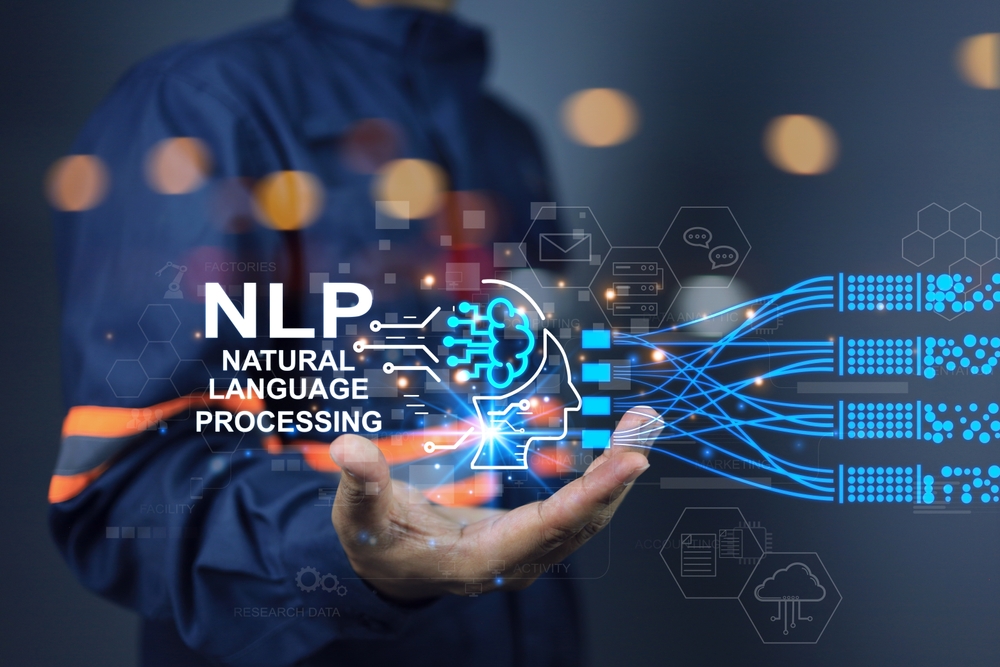Imagine effortlessly communicating with technology as naturally as you’d chat with a friend. Thanks to Artificial Intelligence (AI) and Natural Language Processing (NLP), this once futuristic concept is now a reality. NLP has become instrumental in revolutionizing human-computer interactions, bridging the communication gap between machines and people.
In this blog, we’ll delve into what NLP is, how it’s transforming various industries, its practical applications, challenges faced, ethical considerations, and what the future holds for this fascinating technology.
What is Natural Language Processing (NLP)?
Natural Language Processing, or NLP, is a branch of AI focused on enabling computers to understand, interpret, and respond to human language in a valuable way. By combining computational linguistics with machine learning, NLP allows machines to process large volumes of language data effectively, comprehend context, and deliver relevant responses.
NLP works through various techniques, including:
- Tokenization – Breaking down text into smaller parts (words or phrases).
- Sentiment Analysis – Determining the emotional tone behind words.
- Named Entity Recognition (NER) – Identifying specific entities, like names, places, and dates.
- Language Translation – Converting one language to another seamlessly.
- Text Summarization – Creating concise summaries of lengthy documents.
The Growth and Importance of NLP
The rapid expansion of NLP is driven by its potential to enhance communication and streamline workflows. According to a recent market report, the global NLP market was valued at $19.68 billion in 2022 and is expected to reach approximately $127 billion by 2028, growing at an impressive CAGR of over 36%.
This explosive growth underlines NLP’s crucial role in today’s technology landscape, influencing how businesses interact with consumers and automate processes.
How NLP is Transforming Communication
Enhanced Customer Experience
Businesses are increasingly using NLP-powered chatbots and virtual assistants to provide instant customer support. These AI-driven tools understand customer queries and respond accurately, reducing wait times and increasing customer satisfaction. For instance, companies like Amazon and Apple use NLP extensively in their virtual assistants Alexa and Siri, respectively.
Language Translation and Localization
NLP enables real-time translation across multiple languages, breaking down language barriers for global businesses. Services such as Google Translate leverage NLP to allow users to communicate effectively regardless of linguistic differences. This has significant implications for global commerce, travel, and international collaboration.
Sentiment Analysis for Better Insights
NLP sentiment analysis tools help businesses monitor customer sentiment across social media, product reviews, and surveys. By quickly interpreting user feedback, companies can address concerns proactively, improve products, and enhance their brand reputation.
Real-World NLP Applications
NLP isn’t just theoretical, it’s actively reshaping industries and improving everyday experiences. Here are several prominent real-world applications:
Healthcare
In healthcare, NLP assists with patient record management and clinical decision-making. NLP systems analyze patient records and medical literature to help healthcare providers diagnose conditions accurately, recommend personalized treatment plans, and predict patient outcomes.
Finance
Financial institutions rely on NLP to detect fraudulent transactions, analyze market trends, and automate customer service. For example, NLP-driven chatbots manage customer queries efficiently, helping banks provide rapid responses and support around the clock.
Education
Educational platforms use NLP to personalize learning experiences, offer language learning apps, and automate grading processes. Tools like Grammarly leverage NLP to help users improve their writing skills, offering real-time suggestions and corrections.
Marketing
Marketers harness NLP to perform competitive analysis, monitor brand mentions, and optimize content marketing strategies. NLP tools can identify trending topics, keywords, and user-generated content, enabling brands to stay ahead of market trends.
Legal Industry
Legal professionals utilize NLP to review extensive legal documents rapidly, extract key information, and ensure compliance with regulations, significantly reducing the manual workload.
NLP Challenges and Limitations
Despite its numerous benefits, NLP faces certain challenges:
- Contextual Understanding: NLP still struggles to fully grasp nuances such as sarcasm, idioms, or complex contexts.
- Data Privacy Concerns: NLP applications that rely heavily on personal data can face ethical and privacy-related challenges.
- Multilingual Accuracy: While NLP translation is impressive, achieving flawless accuracy across multiple languages remains challenging.
Continuous improvements in machine learning and language modeling are gradually addressing these hurdles.
Ethical Considerations in NLP
As NLP advances, ethical concerns emerge, including:
- Bias and Fairness: NLP models may unintentionally reflect human biases, leading to unfair or discriminatory outcomes.
- Transparency: Understanding how NLP algorithms reach conclusions can be difficult, raising questions about transparency and accountability.
- Privacy: Managing sensitive data responsibly is crucial to maintain user trust and comply with data protection regulations.
Future Trends in NLP
Looking ahead, NLP is set to experience further transformative developments:
Conversational AI Advancement
Conversational AI will become increasingly sophisticated, with chatbots and virtual assistants capable of deeper contextual understanding and multi-turn conversations that mimic genuine human interaction.
Emotion and Intent Recognition
Future NLP models will more accurately recognize and respond to emotional cues, providing empathetic interactions and highly personalized user experiences.
Enhanced Voice Technology
NLP will advance voice-based interactions, further integrating voice commands into daily life, powering everything from smart homes to autonomous vehicles.
Low-resource Language Support
NLP is likely to expand support for lesser-known languages, promoting inclusivity and global connectivity.
Leveraging NLP for Competitive Advantage
Businesses that effectively adopt NLP technologies can achieve significant competitive advantages:
- Improved Customer Service: Faster, more accurate customer interactions lead to higher customer loyalty.
- Operational Efficiency: Automating routine tasks frees resources, reducing operational costs.
- Better Decision-Making: NLP-driven analytics provide deeper insights, helping companies make informed, data-driven decisions.
Conclusion
Artificial Intelligence and Natural Language Processing are undeniably reshaping communication dynamics across industries. NLP technologies have evolved from basic language processing to sophisticated applications that understand context, emotions, and even intent.
As NLP continues to mature, its applications will expand, making communication with technology even more seamless and intuitive. Businesses embracing NLP stand to gain improved efficiency, enhanced customer relationships, and sustained competitive advantages in the fast-paced digital landscape.
Understanding and leveraging NLP is no longer optional. It’s essential for any organization aiming to bridge communication gaps and thrive in an increasingly connected world.






